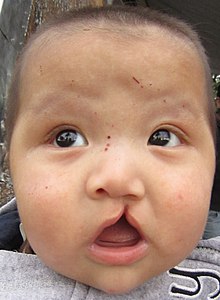Cleft lip and cleft palate
congenital disorder of digestive system
A cleft lip is a birth defect. It is an opening in the upper lip that can expand into the nose. The opening may be on one side, both sides, or in the middle. A cleft palate happens when the palate has an opening into the nose.
| Cleft lip and palate | |
|---|---|
| Other names | Hare-lip, cleft lip and palate |
 | |
| Child with cleft lip and palate | |
| Medical specialty | Oral and Maxillofacial Surgery, Otorhinolaryngology, pediatrics |
| Symptoms | Opening in the upper lip that may extend into the nose or palate[1] |
| Complications | Feeding problems, speech problems, hearing problems, frequent ear infections[1] |
| Usual onset | Present at birth[1] |
| Causes | Usually unknown[1] |
| Risk factors | Smoking during pregnancy, diabetes, obesity, older mother, certain medications[1][2] |
| Treatment | Surgery, speech therapy, dental care[1] |
| Prognosis | Good (with treatment)[1] |
| Frequency | 1.5 per 1000 births (developed world)[2] |
| Deaths | 3,800 (2017) |
The disorder can result in feeding problems, speech problems, hearing problems, and frequent ear infections. Less than half the time the condition is connected with other disorders.[1]
It is a birth defect and may be caused by smoking and drinking alcohol during pregnancy.[1] Other things connected to this are the age of the mother (older mothers are more likely to give birth to children with birth defects) and the sex of the child (cleft lip is twice as common in boys than in girls).[1]
References
change- ↑ 1.00 1.01 1.02 1.03 1.04 1.05 1.06 1.07 1.08 1.09 "Facts about Cleft Lip and Cleft Palate". October 20, 2014. Archived from the original on May 8, 2015. Retrieved May 8, 2015.
- ↑ 2.0 2.1 Watkins SE, Meyer RE, Strauss RP, Aylsworth AS (April 2014). "Classification, epidemiology, and genetics of orofacial clefts". Clinics in Plastic Surgery. 41 (2): 149–63. doi:10.1016/j.cps.2013.12.003. PMID 24607185.